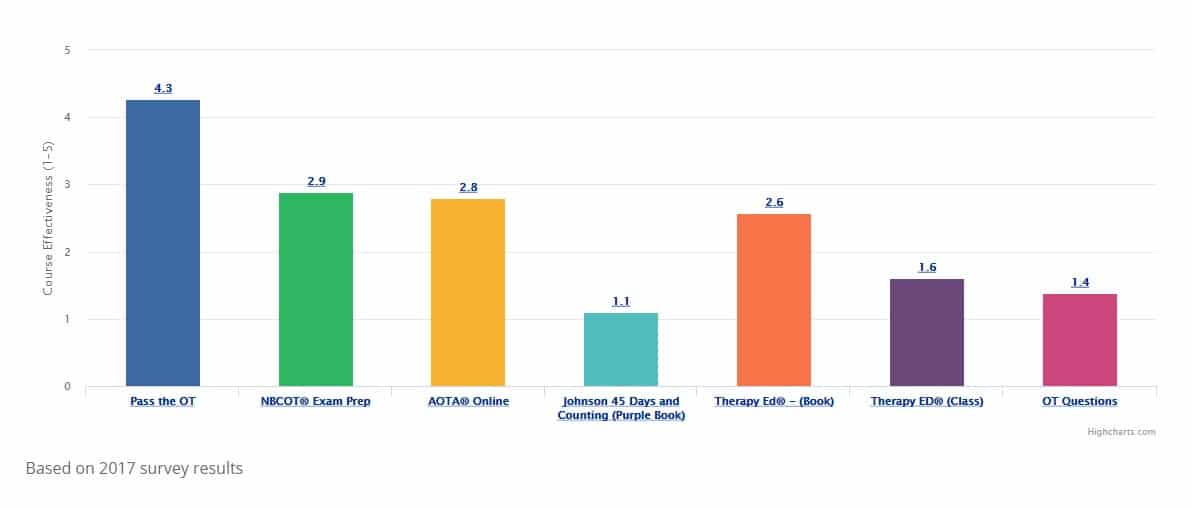
Preparing for the NBCOT® Exam is a long, intense process. No matter how many people you talk to about study strategies, it seems like there’s always more knowledge to be discovered. It is often very hard to know where to start and when to move on. Here are seven tips I wish I knew before I started preparing for the NBCOT® Exam.
1- Its okay to have bad days: In fact, it can even be motivating. Just like OT school, studying for the NBCOT® Exam is a rollercoaster ride. There’s highs, lows, and everything in between. Accept the lows and use that energy to push yourself back into the positive mindset you had initially.
2- It is important that you have a good study plan to follow: There’s nothing wrong with changing your study schedule and even your study prep and tactics, but knowing what you are going to study every day and where to find that material will make your studying so much more effective. I cannot tell you how many countless hours I spent reading the indexes of big boring books trying to find the material that I was looking for. This can be a tremendous waste of time. Subjects that you anticipated excelling at on the exam may turn into your biggest weaknesses, and vice versa. While the initial shock may make you feel as if you’re doomed for failure, you aren’t at all. I repeat, you aren’t. All it takes is a little bit of a schedule switch up and I guarantee you’ll be back on track in no time.
3- Spend more time focusing on your weaknesses instead of your strengths:
Although it is much easier and more comfortable to study what you are good at first, this makes no sense. It makes a lot more sense to study your weaknesses first. This will both reduce your test anxiety and increase your confidence as you get closer to the actual exam. It is also extremely important to have a proper assessment of both your strengths and weaknesses so that you do not waste valuable study time studying material you already understand and know. Without a proper assessment, it is also very easy to feel lost and overwhelmed.
4- Find that spot where you’re most productive and study there: Maybe it’s a noisy coffee shop (it was for me), your kitchen, the library, etc. But, determine a place that motivates you to put in your best work and consistently work there. Not having to worry about where to study will make starting tremendously easier.
5- Have that one person you can count on to be your sounding board: As I said before, you’re going to have highs and lows. While keeping frustration in is certainly an option, sometimes you have to let it all out, before it escalates into something bigger internally. Find a cheerleader for your journey that you can count on and use them when times get tough for a pick me up, whether it be a rant about the difficulties of learning developmental milestones, or sharing a dog video. At the same time, studying with another student or friend might not give you the accountability you need. Having someone who can give you a gauge, so that you know when you are really ready to take this exam, can save you a lot of money and heartache.
6- Sometimes your brain isn’t wholly engaged in studying, which is fine: Just like the days filled with struggle, you will inevitably have ones when your mind is on another planet. Maybe you’re feeling under the weather, or there’s an event going on later that day that you can’t stop thinking about. Don’t feel bad about ending early or taking an extended break when it feels like you’re forcing the study process more than usual. At the same time, try to have a consistent schedule that is manageable. Studying once a week for 12 hours and burning yourself out is not effective either.
7- Focusing only on studying questions can lead to confusion and it makes it a lot easier to be tricked when taking the exam: Remember, 50% of this exam deals with clinical applications. If you are just memorizing answers to questions, without truly understanding the interventions that are related to that topic, you are fooling yourself. The test is much harder than that.
8- When you’re done studying for the day, make sure you’re really done: One of the worst habits I found myself falling into at times was dwelling on my progress when I wasn’t studying. At times, it lead me down a rabbit hole of contemplation about the exam and turned my fun hours into ones filled with stress. Truly getting your mind off the exam is way easier said than done, but forcing yourself to works wonders and ultimately makes you more productive when you are studying.
9- You can waste a lot of time reading complicated material without fully understanding it and taking quizzes that do not simulate actual exam conditions: Taking untimed tests only eliminates the stamina required and your ability to deal with pressure when taking the actual NBCOT® exam. It is best to to try and simulate testing conditions by taking timed tests as well as untimed tests to see how you deal with pressure and how you allocate your time.
10- If you don’t pass, don’t feel totally deflated: Not passing is not the end of the world. In fact, many students have to take this test several times before passing. Some have even taken it more than nine times. At the same time, don’t rush to sign up again without really having a good plan for how to pass. Before you take this test again, you need to make sure you understand all your weak areas and you need to build back your confidence. Not passing is expensive. When you add up testing fees, study prep, and loss employment wages, not passing can cost between $8000 – $12000 per each failed attempt.
Repeating the same study habits and study prep methods after failing the NBCOT® exam and hoping that you will get a better outcome is a mistake that many students make. If your method didn’t work, change your method – study the material differently, invest in a tutor,and give yourself the best chance at passing.




